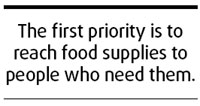Feed them first
(China Daily)
Updated: 2008-04-18 07:31
Updated: 2008-04-18 07:31
The United Nations has named 2008 the International Year of Potato, in recognition of its potential to feed the world's growing population.
After years of being a staple instead of the star, the potato is finally dusting off its jacket and is now entering the food hall of fame and is expected to help solve the current food crisis worldwide.
When the financial markets tumble, the food prices have soared.
Would one appeal after another the United Nations organizations have made to rich nations for helping poor countries stem food prices move their hearts?

The latest one was from the UN Food and Agriculture Organization (FAO) on Monday. It warned that there was a lack of political will to stop famines affecting some 869 million people worldwide, Africans in particular.
A doubling of food prices over the last three years could potentially push 100 million people in low-income countries deeper into poverty. The UN organization's statistics showed that world food inventories have hit rock bottom since the 1980s. Over 73 million people rely on food aid, according to World Food Program.
Various causes for this crisis are being cited in policy circles, including increased demand, rising fuel and fertilizer costs, and climate change. World Economic Outlook, released by the International Monetary Fund, holds bio-fuels responsible for almost half the increase in the consumption of major food crops in 2006-07.
Some of the world leaders have responded to the UN organization's pleas by vowing to put world food security on their political agenda.
Experts and think tanks in every country have been studying the underpinnings of this food crisis so as to find the policy solutions.
This is a necessary job that the world community needs to do now and in the years ahead.
Meanwhile, the hungry mouths in the developing countries ask for immediate help. However, a pledge by British Prime Minister Gordon Brown to raise the issue at the next G8 Summit in July failed to impress World Bank President Robert Zoellick.
France has come up with a political campaign to restore food protectionism at the heart of Europe's agriculture policy.
With food prices soaring to a record high, the effects of the price rises in developing countries are far worse than in wealthy countries.
The first priority is to reach food supplies to people who need them. Considering the long-term reasons for the rising prices comes after that.
(China Daily 04/18/2008 page8)
|
|
|
|